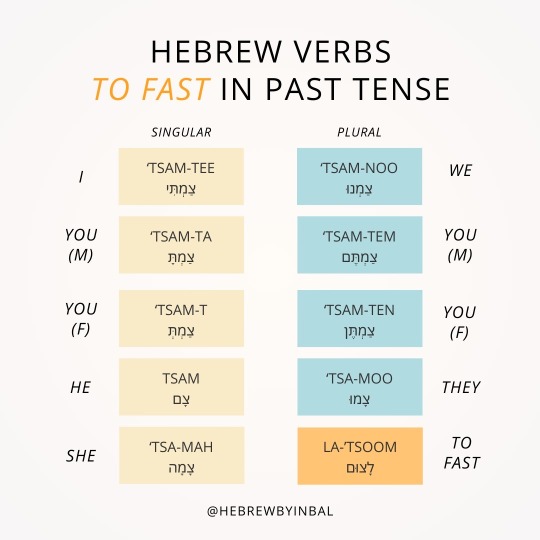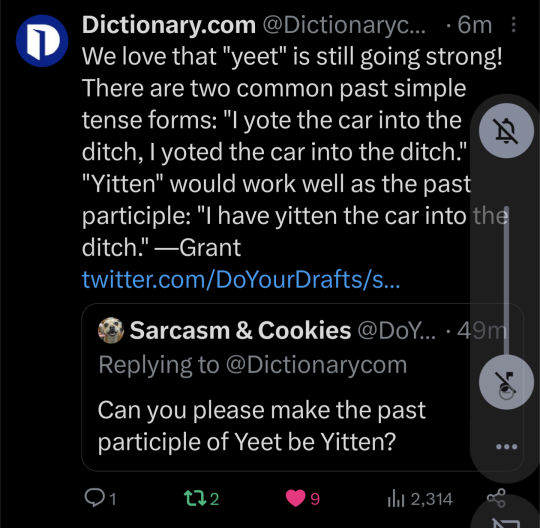#conjugation
Text
Go (Spanish)
I go = Yo voy
We go = Nosotros vamos (m), Nosotras vamos (f)
He goes = El va
She goes = Ella va
They go = Ellos van (m), Ellas van (f)
You all go = Ustedes van
.
Patreon
#studyblr#notes#spanish#language#langblr#spanish langblr#spanish language#spanish notes#spanish studyblr#learning languages#language learning#learning spanish#spanish learning#learning spanish language#spanish conjugation#conjugation#spanish verbs#spanish verb conjugation#verb conjugation
11 notes
·
View notes
Text

🕊️ Unlocking Hebrew Verbs: Past Tense Conjugation for "To Fast"!
In the spirit of reflection and renewal after Yom Kippur, the Day of Atonement, let's delve into Hebrew verb conjugation. 🤓🇮🇱
Have you ever wondered how to express past actions in Hebrew, like whether you fasted on Yom Kippur or not? 🙏🤔
Well, I've got you covered!
In today's conjugation table, we break down the past tense of "to fast" so you can seamlessly converse about your Yom Kippur experiences.
Whether you want to proudly announce, "I fasted yesterday," or ask, "Did you fast?" in Hebrew, understanding verb conjugation is the key.
This knowledge empowers you to share your stories, connect with others, and express your thoughts with clarity.
So, take a moment to explore this valuable resource and enhance your Hebrew language skills.
As we reflect on the significance of Yom Kippur, may your language journey be filled with growth and understanding! 📚🔑
#hebrew#jewish#learnhebrew#hebrewbyinbal#language#hebrew langblr#israel#jew#torah#trending#vocabulary#fast#fasting#conjugation#yom kippur
22 notes
·
View notes
Text
The Complete Japanese Verb Conjugation Video
youtube
25 notes
·
View notes
Text








Ever heard of antibiotics not working anymore? That's the threat of superbugs! These are bacteria that have evolved to resist the drugs designed to kill them. Read through to know more. 💊🦠
#bacteria#science communication#bacteriology#microbiology#nature#microbes#mutation#superbugs#microbiome#conjugation#antibiotics#disease#medicine#biology student#biology facts#biology#biology studyblr#zoology#research scientist#research#scientist#science#science facts#education#discover#scicomm#study blog#study blr#explore#simps for science
8 notes
·
View notes
Text
to have in ixi
/osukubi/ ausukubi (infinitive)
conjugation (irregular):
1sg: /osubi/ ausubi
2sg: /osuk/ ausuk
3sg: /osobu/ ausaubu
1pl: /okubo/ aukubau
2pl: /okusi/ aukusi
3pl: /okib/ aukib
5 notes
·
View notes
Text

How it's going
10 notes
·
View notes
Text
Personal pronouns and conjugating verbs in the present tense
The personal pronouns are:
أَنَا - I
أَنْتَ - you (masculine)
أَنْتِ - you (feminine)
أَنْتُمَا - you two
هُوَ - he
هِيَ - she
هُمَا - the two of them, they both
نَحْنُ - we
أَنْتُمْ - you (masculine, more than two)
أَنْتُنَّ - you (feminine, more than two)
هُمْ - they (masculine)
هُنَّ - they (feminine)
The present tense in Arabic is called the imperfect tense. It expresses an incomplete, continuous or habitual action or on-going state. The imperfect case has three moods: indicative, subjunctive and jussive. I'm only going to cover the indicative mood, which is the basic mood of the verb.
The imperfect tense is formed by adding prefixes and suffixes to the verbal stem. The prefixes and suffixes are as follows:
I: ʾalif + stem + -u
You (masculine): ta + stem + -u
You (feminine): ta + stem + -iina
You two: ta + stem + -aani
He: ya + stem + -u
She: ta + stem + -u
The two of them (masculine): ya + stem + -aani
The two of them (feminine): ta + stem + -aani
We: na + stem + -u
You (masculine, more than two): ta + stem + -uuni
You (feminine, more than two): ta + stem + -ni
They (masculine): ya + stem + -uuna
They (feminine): ya + stem + -na
I’m going to use كَتَبَ (to write) as an example.
أَكْتُبُ - I write
تَكْتُبُ - you (masculine) write
تَكْتُبِينَ - you (feminine) write
تَكْتُبَانِ - you two write
يَكْتُبُ - he writes
تَكْتُبُ - she writes
يَكْتُبَانِ - the two of them (masculine) write
تَكْتُبَانِ - the two of them (feminine) write
نَكْتُبُ - we write
تَكْتُبُونَ - you (masculine, more than two) write
تَكْتُبْنَ - you (feminine, more than two) write
يَكْتُبُونَ - they (masculine) write
يَكْتُبْنَ - they (feminine) write
كَتَبَ is a sound verb. Sound verbs have no associated irregularities in their constructions. Some other common sound verbs include شَرِبَ (to drink), دَرَسَ (to study), سَكَنَ (to live, to reside), فَهِمَ (to understand) and جَلَسَ (to sit).
Other notes:
• There is no need to include a separate subject pronoun with a verb, because the person can be told by the verb conjugation.
• You make the sentence negative by adding لَا directly before the verb.
• You can form the future tense by adding سَوْفَ or سَـ before the verb.
• You can add the particle قَدْ before verb to express possibility (may, might, perhaps).
• The normal word order in verbal sentences is VSO.
Sources:
• Arabic: An Essential Grammar
• Arabic Verbs & Essentials of Grammar
• Practice Makes Perfect: Arabic Verb Tenses
• Wikipedia: Arabic verbs
• Wiktionary: كتب
#polyglot#languages#langblr#languageblr#language blog#langspo#tongueblr#studyblr#Arabic#العربية#grammar#personal pronouns#conjugation
36 notes
·
View notes
Text
✎ vouloir, pouvoir, et devoir
vouloir - to want, wish
pouvoir - can, to be able to
devoir - must, have to
le présent
vouloir
je - veux
tu - veux
il/elle/on - veut
nous - voulons
vous - voulez
ils/elles - veulent
je veux du café au lait. ☕️ i want coffee with milk.
pouvoir
je - peux
tu - peux
il/elle/on - peut
nous - pouvons
vous - pouvez
ils/elles - peuvent
nous pouvons aller à la plage. 🏝️ we can go to the beach.
devoir
je - dois
tu - dois
il/elle/on - doit
nous - devons
vous - devez
ils/elles - doivent
tu dois tourner ici. 👈 you have to turn here.
#self study#french#french langblr#french language#french learning#frenchblr#langblr#language learning#french vocab#foreign languages#study french#conjugation
18 notes
·
View notes
Text
I forgor
I regularly ferger things
Damn I've forgorren already
I'm so fucking fergerful
I'm literally always fergerring everything
4 notes
·
View notes
Text
I learned yesterday that Khmer has no inflections no conjugations, and zero copula..... honestly super cool !!!
#i was wondering recently if a language could exist w no conjugations or anything and yea def!!#linguistics#my speech#khmer#khmer language#conjugation#inflections#copula
2 notes
·
View notes
Text
Verbs with Strong Preterit Forms
poder
poner
saber
venir
hacer
querer
decir
traer
ser
ir
dar
ver
estar
tener
.
Patreon
#studyblr#notes#langblr#language#spanish#spanish langblr#spanish studyblr#spanish language#strong preterit forms#grammar#spanish grammar#spanish conjugation#conjugation#verbs#verb forms#spanish verbs#spanish verb forms#verbs in spanish#vocabulary#vocab#spanish vocab#spanish vocabulary
34 notes
·
View notes
Text
Hebrew is so wisely built, it has families of words connected in meaning, root letters constructing the words distributing them into families, and structures of verbs for different actions.
Want an example?
ga-'nav is Thief and Stole in singular masculine
leeg-'nov is To steal
le-heet-ga-'nev is To Sneak Up On Someone
g-ne-'nah is Theft
le-hag-'neev is to Sneak Someone/Something In
Cool, right?
👷♀️ Hebrew is like a well built architectural marvel.
In the final module of Practically Speaking Hebrew you learn how to make sense of verbs, how they work, and how to DIY them 💪
#verbs#conjugation#mission impossible#dogs#hebrew#learnhebrew#hebrewbyinbal#language#hebrew langblr#jumblr#sneaky#hebrew language#langblog
9 notes
·
View notes
Text
Russian verbs 2nd conjugation
Verbs such as учить говорить смотреть similarly to 1st conjugation verbs end with -ть. However unlike in 1st conjugation verbs, ть is proceeded by и or е. The present tense stem is therefore created by removing the -ить or -еть ending.
я говорю мы говорим ты говоришь вы говорите он/она/оно говорит они говорят
After letters к, г, х, ж, ш, щ, ч, ц write у and а instead of ю and я.
я учу мы учим ты учишь вы учите он/она/оно учит они учрат
4 notes
·
View notes
Text
Exercice pour apprendre la conjugaison au plus que parfait | 20 Verbes
Apprendre la conjugaison des verbes au plus que parfait en s'amusant !
Cette vidéo vous propose un exercice ludique pour vous aider à maîtriser la conjugaison au plus que parfait facilement.
Cliquez ici 👉 YouTube

#excercise#apprendre le français#langue française#apprendre#frenchblr#vocabulaire français#francophonie#french language#french#education#français#french vocab#francais#french langblr#conjugation#conjugaison#apprendre le francais#aprenderfrances#apprentissage#learnfrench#learning languages#language learning
3 notes
·
View notes
Text
To rain in søłsiþe
ot rjene-rjener
rain (noun): rjen (common)
2 notes
·
View notes
Text
Past and Future Tenses
Once again I have changed everything <3 Here are the simple past, present, and future tenses:
Past:
1st Pers Sing: -ɪg
2nd Pers Sing Informal: -ɪv
3rd Pers Sing Informal: -ɪl
3rd Pers Sing Formal: -ivə
1st Pers Plural: -tigə
2nd Pers Plural Informal: -ɾiv
2nd Pers Plural Formal + Sing Formal: -ʃiɾə
3rd Pers Plural: -ilə
Present:
1st Pers Sing: -ɾə
2nd Pers Sing Informal: -ɾav
3rd Pers Sing Informal: -eɾə
3rd Pers Sing Formal: -tə
1st Pers Plural: -ɛt
2nd Pers Plural Informal: -ɾav
2nd Pers Plural Formal + Sing Formal: -ɾak
3rd Pers Plural: -ɾatə
Future:
1st Pers Sing: -go
2nd Pers Sing Informal: -uvo
3rd Pers Sing Informal: -oɾ
3rd Pers Sing Formal: -oʃ
1st Pers Plural: -otə
2nd Pers Plural Informal: -vo
2nd Pers Plural Formal + Sing Formal: -okə
3rd Pers Plural: -uɾə
In addition to simple past, present, and future, Goblin has a far past and a far future that are marked with auxiliary words, not conjugations. The auxiliary word for far future is hagə (coming from hagtaɾ, or “someday”) and the auxiliary word for far past is glaʃ (meaning once as in “once upon a time”). These words either go at the start of the sentence (for more poetic uses) or directly before the conjugated verb (for casual speech).
3 notes
·
View notes